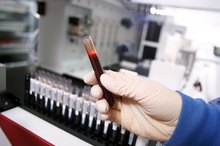What Causes a High Level of Protein in the Blood?
High levels of Protein causes
High levels of protein in the blood can be a serious health concern due to the underlying conditions that may have created this abnormality. However, it should be noted that one thing that does not cause high-protein levels is a high-protein diet. Instead, chronic inflammation or infection is usually the cause of high protein levels in the blood.
Immune System
What May Cause Too Much Protein in Blood?
Learn More
Raised levels of protein in the blood are a signal that other health issues are going on in the body. Infection and inflammation are two possible causes, the most serious of these being HIV and hepatitis. HIV can result in a disruption in the body's immune system to the point that it no longer works. The inflammation normally needs to be reoccurring to increase protein levels to a point of concern. Other inflammatory conditions that might cause raised levels of protein include arthritis.
Bone Marrow
In rare instances a raised protein level in the blood can indicate a disease associated with bone morrow. Bone marrow is the material found on the inside of the bone and is where all blood cells originate. Sometimes high protein levels can indicate cancer such as myeloma. This is a cancer of the blood and is found in plasma cells, which are mainly located in the bone marrow. They work with the immune system by making antibodies to fight infections, and a cancer in these cells creates a weakness in the immune system. The abnormal amounts of protein that result from myeloma can also cause hyperviscosity syndrome, which is is a thickening of the blood to the point of affecting brain function.
Related Articles
References
Writer Bio
Keith Dooley has a degree in outdoor education and sports management. He has worked as an assistant athletic director, head coach and assistant coach in various sports including football, softball and golf. Dooley has worked for various websites in the past, contributing instructional articles on a wide variety of topics.








